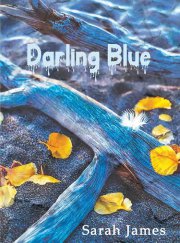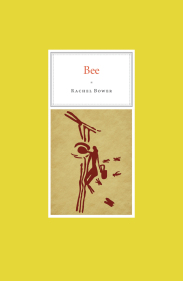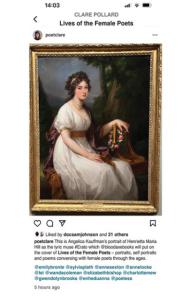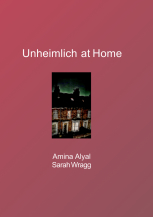
2016
OCTOBER CONRIBUTORS
Kitty Coles, Holly Day, Howard Richard Debs, Maurice Devitt, Steve Klepetar,
Ann Manov, Maria C, McCarthy, Michael Minassian, Kenneth Pobo, John L. Stanizzi,
Paul Summers, Grant Tarbard.
KITTY COLES
Rapunzel
Dark witch, dark tower,
pale girl with yellow hair and you,
on horseback, endlessly riding to rescue her
across a landscape of mists and brackish water.
You think she waits as still
as a fly in amber
but could she, after all, be keeping going
and writing the end of her story without your help?
Maybe she has grown very tired of everything,
of the silences dripping
from every stone of the place.
Maybe she's gathered her yellow hair into her lap
and woven a rope from it
and stepped into air,
leaving her silence as her last response.
Maybe she's broken her window,
let down that rope and lowered herself
to the blanket of the night.
In the darkness, you may have passed her
and never known her, her eyes downcast,
less beautiful than you thought her.
Maybe she, unlike you,
is not afraid of the witch.
Maybe they study together, close as sisters,
and teach themselves
to build something out of nothing
so that, when you come,
they close their ears to your knocking
and draw the curtains and will not answer your call.
Maybe she's spent her days in honing
the edge of her comb
to the narrow edge of a blade
which she uses to quietly
part the halves of the witch's heart.
Then she lives alone in the tower,
content in its silence.
She lives alone
and never dreams of your coming.
Kitty Coles has been writing since she was five and works for a charity supporting disabled people. Her poems have appeared in magazines including Mslexia, Iota, Obsessed With Pipework, The Interpreter's House, Frogmore Papers and Ink Sweat and Tears.
HOLLY DAY
The Very Last Drop
on the last day, when the world finally ends, I hope
I’m sitting in my car, driving somewhere nice, thoughts of the day ahead
filling my head with anticipatory joy. I hope my favorite song
is playing on the radio, and I hope that I have just enough time to sing along
all the way to the end of the song.
if the world was to truly end on a perfect note, then I
would have a cup of coffee by my side
hot but not too hot, and just enough to last until the very
last second. I don’t really care how it all ends,
so long as I don’t know it’s coming, so long as
I don’t have to think about it, have to prepare for it, have to dread it
in any way. I don’t want to live through
global starvation, a prolonged, senseless war, weeks of
television shows featuring children dying somewhere else.
I want the end
to be something nobody saw coming but the sandwich-board
prophets, standing crazy on street corners, waving their dirty fists
up at the sky as if at
some god up there
was glaring down at the earth, making maniacal plans
to destroy everybody and everything we’ve taken so comfortably for granted.
I
want to end up like those mammoths dug out of rock ice in Russia
found completely intact, flash frozen, with food still in their mouths
caught by disaster in mid-chew, mid-thought
completely surprised.
Holly Day has taught writing classes at the Loft Literary Center in Minnesota since 2000. Her published books include Music Theory for Dummies, Music Composition for Dummies, Guitar All-in-One for Dummies, Piano All-in-One for Dummies, Walking Twin Cities, Insider’s Guide to the Twin Cities, Nordeast Minneapolis: A History, and The Book Of, while her poetry has recently appeared in New Ohio Review, SLAB, and Gargoyle. Her newest poetry book, Ugly Girl, just came out from Shoe Music Press.
Back to POETRY ARCHIVE
HOWARD RICHARD DEBS
The New Cat
Our old cat died in ’98.
She lived some 20 years
in the house in which our
daughters grew to womanhood.
She left us a month after
my father-in-law died, hearts
gave out for both.
The girls used to put her
in a doll carriage, tied
a bonnet on her head
she let them do that.
It took me all this time
to learn to live with the
fact she was no more.
She’s laid to rest in
the backyard, underneath
a stone birdbath, she would
have liked that I think.
We have a new cat now,
Tiger is his name.
He came our way
just days before
we got the news
my brother-in-law
had died of cancer.
Somebody said at
the funeral, dying
is a part of living.
Which, the easy
or the hard part?
Howard Richard Debs received a University of Colorado Poetry Prize at age 19. Finalist and recipient 28th Annual 2015 Anna Davidson Rosenberg Poetry Awards, his work appears internationally in numerous publications. His photography will be found in select publications, including in Rattle online as “Ekphrastic Challenge" artist and guest editor. His full length work Gallery: a Collection of Pictures and Words is forthcoming January 2017 (Scarlet Leaf Publishing).
Back to POETRY ARCHIVE
MAURICE DEVITT
Aleppo is Burning
We rise early, pack rucksacks with the skeletons
of our lives, store sleep for later and fold in
with the crowd. A peloton, swarming
for the border, unprepared for the broken mirrors
of angry faces, three-card tricks and the suspended
animation of a new limbo, the bald patch between tufts
of border-posts, where names and nationalities
are easily displaced and our hearts are overtaken
by the rhythm of battered coaches, idling
on the other side of the fence. They will carry us,
blind-folded, through the sticky nights,
lips moistened by cheap perfume, to a port
with shuttered windows and a boatman,
peddling porous promises of freedom.
*
The freedom that allows us to circle the compound
as often as we like, play football on the beach
and, when the sky darkens to cobalt-blue, watch
the tempting lights of boats in the channel, pinch
the coast of England between our fingers
and stand for hours in the mizzle and mud, tight knots
of silent conversation, for we have forgotten the formula
for sleep and know, that even when we rise,
Calais will still be burning.
In 2016 Maurice Devitt was selected for the Poetry Ireland Introductions Series and shortlisted for the Listowel Poetry Collection Competition. Winner of the Trocaire/Poetry Ireland Competition in 2015, he has been placed or shortlisted in many competitions including the Patrick Kavanagh Award, Over the Edge New Writer Competition, Cuirt New Writing Award and the Doire Press International Chapbook Competition.
Back to POETRY ARCHIVE
STEVE KLEPETAR
Slow Parade
Here comes a slow parade along the stillborn avenue.
All the ghosts have returned, their faces flattened and damp.
Outside, the rain won’t quit, and the leaves look sodden
and old. The day is overripe. Ever since morning swelled
over a line of trees, it has felt like the inside of a slowly
rotting peach. Children have gone back to school
with their backpacks and pencils made of flame.
Busses gasp along broken streets, roadwork everywhere.
Only you remain immobile on a bed of nails. I long for
metal and wood, a hammer to pound with, a workshop
for turning planks into something worth filling with all
this bric-a-brac: the Chinese horse you cherished,
and the necklace of bronze; the stone plate
the Aztecs made. Sometimes the tiniest sound changes,
or the smell. Sometimes someone enters, and voices swirl,
but mostly the room remains in half-light. Music soaks
into spongy walls. Out in the corridor, an old woman asks
how you are today. I want to point to my wrinkled shirt.
“See here”, I would say, “your question sings like a hundred
birds in a burning tree. For your silence, I would hold out my palms.”
Steve Klepetar’s work has appeared widely. His poems have been nominated for the Pushcart Prize and Best of the Net. Recent collections include My Son Writes a Report on the Warsaw Ghetto and The Li Bo Poems, both from Flutter Press, and Family Reunion, forthcoming from Big Table Publishing.
Back to POETRY ARCHIVE
ANN MANOV
On
Reading L’Étranger
It still smells of the dunes where I read it,
One noon-to-two. Toddlers
In tropical prints dotted the sea like Kandinsky’s
Bleu de ciel. From a chaise longue, a throaty retiree
Praised her sister who’d turned seventy—
She’d not complained once. That was the season
Of Hurricane Hanna, when a swimmer drowned
Ten miles south. Any one of the French in straw hats
And linen could have been Meursault, pupils narrow
And aimed at the Arabs who toyed with guns on the pier.
(My brother had seen them once, by the Mexicans
And their moonlit fishing rods and silvery blue runners.)
All day at the mosque-white Meadows Pool, we high-schoolers
Brushed our tans together, looking away, later leaving
Chlorine-green hairs on half-strangers’ sheets.
(Like Marie, some asked if I loved them,
Never receiving a response.) Aujourd’hui, Maman
Est morte. I watched mine limp to the driveway
For the Times hot with sun, spread it on the oilcloth,
And spoon canned tuna to her mouth. The kitchen
Was clinical white, fresh-bleached by the Brazilians.
(This was before they were deported.) She and I did
Not speak much then. We
did not need to.
Breathless
The Soviets evacuated Moscow. My father was born
On the frozen Izh, future land of AK-47’s
And of Stalin’s Finno-Ugric plot. Two weeks later, Germans
Came to a conclusion at Wannsee, best beach in Berlin. In five months,
They shot the Jews of Pryluky into the muddy Uda,
Fresh-melted with May.
***
The year they tried Eichmann, the Communists closed
The last synagogue there, where not-yet-secret rabbis taught
My grandpa just before he left, and the Jews spent a last fall.
Then Yeltsin gave up the fight in Brest. A few escapees flew
Back and trembled at funerals for the young. There aren’t coffins.
The flowers are un-wilting silk. On film, the synagogue is peach.
Three bare black birches obscure it. An old man trails
Fingers on the fence and speaks words I mistake for German.
I don’t follow.
***
Summers in Latvia, my father swam, eating scarlet tomatoes
And rationed ham. In his album with the bas-relief of Peter the Great,
I see a cat-thin child struggle to keep his head above the water,
A phrase he shrieks to my shiksa mother, shaking wrists weak with stroke.
My brother and I sneak
out the door, laughing, out of breath.
Ann Manov is a graduate of the University of Florida (English, Spanish, and French and Francophone Studies.) She is a current Fulbright fellow in Strasbourg, France. Her work has appeared previously in SAND: Berlin's English Literary Journal; Intersect: The Stanford Journal of Science, Technology, and Society; The Quint: A Literary Journal from the North; Wanderlust; and The Independent Florida Alligator.
Back to POETRY ARCHIVE
MARIA C. MCCARTHY
Turning wood
He sees an old woman bent in a crook
of a cherry tree in the pub garden.
He has a piece of cherry
awaiting the tools
in his workshop;
it has knobbles,
uneven,
like the breasts
of a Picasso,
and ever since he’s seen them as breasts
he’s been looking for a woman with breasts
like that, to model it on.
It’s the curve of a woman’s back that fascinates,
the way she turns and bends, he sees it in the grain.
What others don’t realise,
there’s wood in everything,
and everything is wood.
Maria C. McCarthy writes poems and stories, and is poetry and fiction editor for Cultured Llama Publishing. She was the winner of the Society of Authors’ Tom-Gallon Trust Award 2015. www.medwaymaria.co.uk
Back to POETRY ARCHIVE
MICHAEL MINASSIAN
The Restaurant Of Books
With a wave of my hand,
I invite passersby into my restaurant:
“Here,” I say, “have a seat at this table
next to the window. Compose a sonnet
or a short essay in praise of the view.”
First, I offer a salad of haiku or tanka
& a glass of quotations
from a vintage year;
followed by a meal carefully balanced
with a memoir or novel, contemporary
American or perhaps a 19th century
French roman a clef in a new translation.
Dessert is always a thin volume of poems
with a cup of Chinese calligraphy
& for those desiring a digestif,
a philosophic essay on epicurean excess
or ancient bookbinding may suffice.
“Thank you for coming,” I whisper
as they leave. Then watch them stumble
out into the night with full stomachs
& a parting word chosen at random
from a dictionary or encyclopaedia of verse.
This Winter Day
눈 (noon)
The clouds are piled up
like a train wreck
across the sky,
and tongues of rain freeze
before they hit the ground.
Back inside the house,
you stir the soup
and spoon out rice
into the celadon bowls.
I see you look up
as I come in the door.
You told me once
the word for snow
in Korean is the same
as the word for eye.
Outside the world
is turning white;
I imagine being lost
in a blizzard
with only the memory
of your glance
to guide me home.
Michael Minassian lives in San Antonio, Texas. His poems have appeared in such journals as The Aurorean, The Broken Plate, Exit 7, The Lake, Third Wednesday, and Verse-Virtual. He is also the writer/producer of the pod cast series Eye On Literature. Amsterdam Press published a chapbook of poems entitled The Arboriculturist in 2010. “The Restaurant of Books” previously published Fall 2010 in Nebo: A Literary Journal.
Back to POETRY ARCHIVE
Orange Planet
My soul and I visit
an orange planet called
a Mexican sunflower.
Orange blossoms cover it
like a mumu. Who knew
that planets can be found
in yards? My soul says
I shoudn’t call it a soul.
It would prefer to be known
as the silence between
a shed and a moon
flower blooming after supper.
I’d prefer a shorter name,
but I’ll get used to it.
I won’t, however, get used to
a planet on a stem
that scientists have yet
to explore, buds
dismantling telescopes,
opening just under
the sun’s fingertips.
I Like To See My Plants Naked
My Show And Tell dahlia
wears the most gorgeous black
cocktail dress made of night.
A firefly tiara tops off the ensemble.
This morning the garden,
has the Show and Tell showing—
and telling. Stark naked in bright
lighting. Perhaps I should
close my eyes or turn my back.
I don’t. If the dahlia’s mellow
while being starkers in a suburb,
why should I care? I say
“My, your red and yellow
look like a lake at sunrise.”
The blossom soon withers.
Like me.
All gone.
Only the ground
to take us in.
Kenneth Pobo has a new book forthcoming in 2017 from Circling Rivers Press called Loplop in a Red City. In addition to The Lake, his work has appeared in: Orbis, The Fiddlehead, Amsterdam Review, Hawaii Review, and elsewhere.
Back to POETRY ARCHIVE
JOHN L. STANIZZI
Them Belly Full (But We Hungry)
for my students at Manchester Community College
My student from Nam speaks hardly any
English, and yet here she is trying hard
to comprehend the nonsense of John Donne
attempting to con a girl with some jive
about a flea. And my boy from Haiti
rolls his eyes with disgust when I bring up
Daddy and Plath and ovens and babies.
I have students from the Dominican,
Ukraine, Puerto Rico, and the good old
U.S. of A, all of them chasing what
they heard was the pot of gold they’d find here.
And I’m sure I see the traces of smiles
when I say that if Jamiaca Kinkaid
can rise up from the ashes, so can you.
Framed
…for my father
He spent months in the basement
at war against forgetting;
scissors his weapon,
he trimmed hundreds
of old photos,
cropping away excess,
that which might distract him
from the people
he was desperate
to save,
leaving just the essentials,
those faces which inspired someone to say
Let’s get a picture.
He cut away
trees, cars, houses,
encroaching shadows,
and what was left behind
he fashioned into collages,
bringing generations together
in black and white,
in faded color,
gathering what he recognized
as family,
their rough, curled edges
held together with tape,
a congregation of the living
and their ghost kin,
a crowd of his own design
of faces remembered,
resurrected joy,
and the imperative to stay close
lest they get separated, lost.
He rubbed against
the corners of longing,
leaving a vaguely translatable remnant,
the wake of his affection,
the stain of his demands,
that which he was thinking,
memories he marshalled
and tried to hold.
John L. Stanizzi, author of Ecstasy Among Ghosts, Sleepwalking, Dance Against the Wall, After the Bell, and Hallelujah Time! His poems have appeared in American Life In Poetry, Prairie Schooner, Rust + Moth, The New York Quarterly, Rattle, and others. He teaches literature at Manchester Community College. www.johnlstanizzi.com
Back to POETRY ARCHIVE
PAUL SUMMERS
cadenza
wherever we cry
it is far from home
anne michaels (ice house)
i. mesothelioma
quite a gobful
for untrained
tongues; each
syllable reluctant,
left hanging on
your fragile lips.
a lawless throng
of clustered cells
now mustered from
an epoch’s sleep.
i fix on endings:
a bauble of breath,
a flake of heart;
impervious to flame.
ii. 9 o’clock news
tonight the stars
exert their force
a thousand tonnes
of pressure per lumen
each stacked like hands
on the crown of my head
i dread these calls each
bulletin of hopeless news
her death decanted
into drip-fed despatches
the moon is weak
a blueness dissolving
like the rhythms
of his voice.
iii. the hypocrisy of prayer
you will be smiling & in your sleep
mid-way through a super 8 re-run
of your wedding day (edited of drizzle
& the gnaw of cold) all of us are there;
the living & the dead. all chronology
abandoned. our faces flawless & re-cast.
an endless honour-guard from the church
to the car. grinning like idiots & hurling rice.
& you are resplendent & ripe with hope,
glowing with the aura of a mass-card virgin
no resemblance whatsoever
to a desiccated corpse
strewn in some contortion
in the birkenau clay
iv. hall of souls
& the rain will fall
in smoke-blue clouts
fix grey to grey
our sea & sky
rough-shod
but inseparable
we bear the pall
your glass-eyed boys
fragile & cack-handed
there is no weight to it
an ossuary of swan-
bones & familiar skin
the pull of its vacuum
sucking in our cheeks
v. cadenza
dad is reworked
in blanc de chine
his features buckled
like land-bound waves
the sky is gaunt
the crows look on
they skirt our grief
as if contagious
the fire steals
another feast
a whistle of steam
escaping her bones
a single shrill note
hanging in its orbit
Paul Summers is a widely published Northumbrian poet. Recent publications include union (new & selected) & primitive cartography. His latest collection straya is forthcoming in 2017.
Back to POETRY ARCHIVE
GRANT TARBARD
The Scenery Built Around Silence
The baby fusses for its mother’s sour teat
turned to salt in this balmy April
afternoon, in the theatre bar where I now
rest. She re-enacts the phantom movements,
an exhausted mime migrating
her raw chalk breast to the beckoning babes
unplucked lips, new as a grass shoot.
Hush is on tick, drifting as fog.
The powdered lull, as lyrical as a waxen flower.
You’re a lucky one the mother intones
look at that man there,
the one with the belly of a gull, grizzled straws
of hair, pallid man, he doesn’t have a dahlia
hidden in his pocket I can tell you.
The old man, with a face like an unmade bed
just curled the edge of his newspaper.
The Conceit of Me
There's no dignity in me, I'm laid bare,
stripped carcass pummelled with needles, small cock
wrapped in cottonwool like a tooth for the
fairies. Take out my stomach, expel it
from the sour of the morning, my red raw
splayed carrion tutting in my bowels.
I was a shoplifter, whooshing rugs out
of supermarkets, that beautiful me
has been an act of philanthropy, these
loose boards are stuffed with stolen mice to feed
us through the fainting linen midwinter,
conceited me that bloats our hamlet's tat.
And me is bare skinned, me is a sealed box,
me feet have changed shape to sow my stubble.
Grant Tarbard is the author of the newly released Loneliness is the Machine that Drives this World (Platypus Press). Follow him on Twitter at @GrantTarbard.
Back to POETRY ARCHIVE



